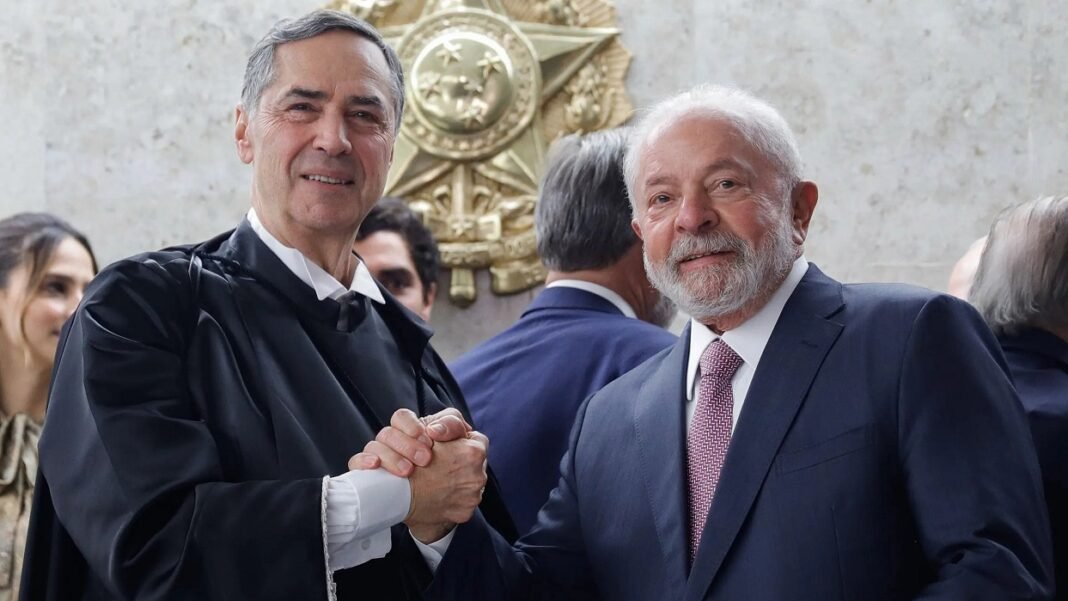Amid renewed international diplomacy and domestic political turbulence, Brazil’s political landscape has entered a week of sharp contrasts. President Lula’s direct conversation with U.S. President Donald Trump marked an unexpected geopolitical rapprochement, even as his government faced a setback in Congress over tax measures. At home, Lula’s approval ratings improved, while tensions with the Centrão resurfaced through dismissals and legislative defeats. The week also closed with a symbolic moment in the Judiciary: the retirement of Supreme Court Justice Luís Roberto Barroso, ending a decade marked by institutional confrontation and democratic defense.
This Content Is Only For Subscribers
To unlock this content, subscribe to INTERLIRA Reports.
Conversation with Trump
The most expensive cup of coffee in the United States was one of the main topics during Monday’s (06/10) conversation between President Lula (Workers’ Party) and U.S. President Donald Trump. The dialogue marked a significant step in the rapprochement between the two leaders, which began in September with an informal exchange at the UN General Assembly in New York. According to BBC News Brasil, Trump acknowledged that the U.S. is “missing” several Brazilian products affected by the 50% tariff imposed by his administration on many Brazilian exports—specifically citing coffee as an example.
Blow to Bolsonarism
The call between Lula and Trump delivered a political setback to Brazil’s right-wing opposition, already unsettled by the uncertain outlook for the 2026 elections. While Lula’s administration is regaining approval and pushing forward popular measures such as expanding the income tax exemption bracket, the opposition remains divided, as a name to replace former President Jair Bolsonaro has yet to be confirmed. The cordial tone between Lula and Trump, including discussions about a future in-person meeting, was seen as politically damaging to Bolsonaro’s camp, particularly his son Eduardo Bolsonaro (PL-SP). Government allies seized on the episode to weaken Bolsonarism’s narrative, while Bolsonaro’s supporters attempted to minimize its significance.
Improvement in Approval
A new Quaest survey released on Wednesday (08/10) shows Lula’s approval rating recovering and nearly matching disapproval within the margin of error: 48% of respondents approve of his government, while 49% disapprove. It is the first time since January that both indicators have converged. Earlier in the year, 49% disapproved of Lula and 47% approved. The gap between positive and negative evaluations peaked in May, when disapproval reached 57% and approval fell to 40%. The survey, commissioned by Genial Investimentos, interviewed 2,004 people aged 16 or older between October 2 and 5. The margin of error is two points, with a 95% confidence level.
Government Defeat
On Wednesday (08/10), the Chamber of Deputies delivered a significant defeat to Lula’s administration by allowing a provisional measure intended to increase tax revenue to expire. The text, introduced in July to replace a controversial decree raising the IOF (Tax on Financial Transactions), was withdrawn from the agenda before a vote could occur. The measure requires approval from both chambers before expiring the next day. Opposition parties, led by the Centrão, coordinated the move that prevented the vote, marking a rare legislative setback for the government in an area central to its fiscal strategy.
Dismissals
Following the defeat in Congress, the government dismissed several political appointees linked to Centrão lawmakers. Those removed included figures associated with the PP and PL at Caixa Econômica Federal, PSD appointees in the Ministry of Agriculture, and MDB members at the National Department of Transportation Infrastructure (DNIT). Officials at the Planalto Palace pointed to the involvement of PP President Ciro Nogueira and PSD leader Gilberto Kassab in the negotiations that led to the measure’s expiration. The move signaled a reassertion of control by the Executive over its coalition after a week of political turbulence.
Retirement
Justice Luís Roberto Barroso announced his retirement from the Supreme Federal Court (STF) on Thursday (09/10), at the end of the Court’s session. At 67, Barroso could have remained on the bench until 2033, when he would reach the mandatory retirement age of 75. Appointed by former President Dilma Rousseff in 2013 to replace Justice Ayres Britto, Barroso served as STF president in 2023. His presidency was marked by historic rulings, including the conviction of former President Jair Bolsonaro for attempting a coup d’état—the first such conviction of a former president in Brazil’s history. Barroso’s tenure also coincided with a period of institutional tension between the Judiciary and Bolsonaro’s supporters, which persisted even before he assumed the presidency of the Court. He officially passed the role to Justice Edson Fachin last week.
Analysis:
Recent political events in Brazil reveal the country’s delicate balance between diplomacy, governance, and coalition management. President Lula’s direct conversation with U.S. President Donald Trump represents a pragmatic shift, showing his willingness to engage even with ideologically distant leaders to secure trade and economic gains. The move could open new negotiation channels on tariffs and exports while reinforcing Lula’s image at home as a leader capable of bridging political divides.
At the domestic level, the mix of rising approval ratings and a defeat in Congress reflects both the strength and vulnerability of Lula’s strategy. The improvement in public support stems from popular economic measures such as tax relief, yet the legislative setback exposes persistent friction with the Centrão bloc, whose cooperation remains crucial to advancing the government’s agenda.
Justice Luís Roberto Barroso’s retirement from the Supreme Court marks the end of a period defined by institutional confrontation and judicial efforts to safeguard democracy. His departure now places on Lula the task of appointing a successor who can preserve judicial independence while navigating the political expectations of both allies and critics.
Source: G1 [1] [2] [3], O Globo [1] [2] [3], Folha de S. Paulo




